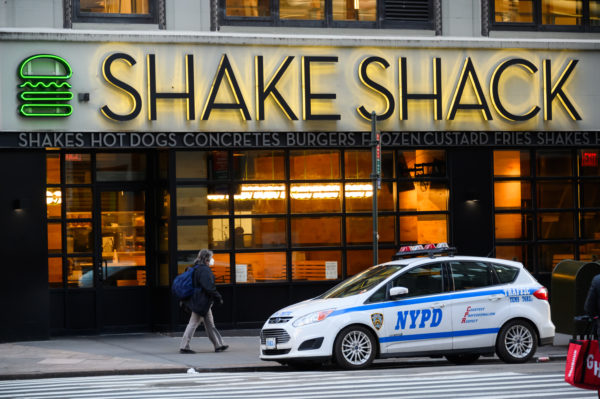A former Shake Shack manager falsely accused of poisoning a group of police officers’ milkshakes last June has filed a lawsuit against several NYPD officers and two police unions that perpetuated the false allegation.
According to 28-year-old Marcus Gilliam, the former manager of the Manhattan Shake Shack, he and his staff were berated and humiliated by officers last year during an investigation into the alleged poisoning.

“They had me make a milkshake in front of them,” Gilliam told New York Daily News. “As I was adding the custard, one of the officers said, ‘At what point did you add the bleach?’ They were trying to get me to admit to something. They were trying to coach my words.”
According to the lawsuit, filed on Monday in a federal court in New York and obtained by Atlanta Black Star, Gilliam was taunted, “falsely arrested, and suffered emotional and psychological damages and damage to his reputation,” as a result of the false allegation.
On June 15, 2020, as protests following the death of George Floyd continued across the country, three NYPD officers claimed they were intentionally poisoned by employees at a Shake Shack location. The officers complained that they weren’t feeling well and were hospitalized before being released.
The allegation sparked immediate outrage, promoting Shake Shake to release a statement via Twitter saying the company was “horrified” and working with police.
Detectives’ Endowment Association (DEA), a union for NYPD detectives tweeted about the incident, as did the Police Benevolent Association of the City of New York (PBA), the city’s largest police union.
But Chief Rodney Harrison, NYPD’s chief of detectives, issued a statement the following day, sharing that an investigation had found that “no criminality” occurred.
Investigators found that cleaning solution not fully rinsed out of the machine could have made the officers sense an off taste. Furthermore, the officers had placed their orders on a mobile app, and the orders were fully packaged before they arrived, and before any employees could have been aware that the customers were police officers.
Defendants named in the suit include both police unions who spread the false allegation, along with the three officers who claimed they were sick, identified by the flavor of shake they ordered, as well as officers who participated in the investigation.
After officers identified as Strawberry Shake, Vanilla Shake and Cherry Shake arrived to pick up their orders at about 7:30 p.m., they complained that they did not taste right and threw them away, according to the suit.
The officers informed Gilliam of their complaint, and Gilliam apologized before providing the officers with free food and milkshake vouchers.
The officers told their sergeant a “toxic substance,” potentially bleach, had been added to their shakes, and at 9:20 p.m., authorities arrived at the shop to set up a crime scene. The milkshakes were tested and no evidence of bleach or other toxic substances was found.
Gilliam was among the employees detained and questioned by authorities.
“They were taunting us, ‘Ha, ha, ha. Look at us, we work at Shake Shack.’ We were sitting on the floor and they were sitting in our chairs. It’s supposed to be protect and serve, but they were bullies,” he said. “One girl was crying, and another staff member quit.” At this point, a sergeant named in the suit asked Gilliam, “When did you add the bleach?”
Security footage showed no employees had added any toxic substances to the milkshakes, but the sergeant later told Gilliam, “You put three of my cops in the hospital.”
The suit alleges that the officers were released from the hospital without showing any symptoms.
An NYPD lieutenant sent an email to the PBA and the DEA claiming the officers had been made sick by the beverages, which prompted each union to tweet out warning messages about the alleged incident, each of which was shared thousands of times. Gilliam said the tweets were posted before any real investigation had occurred.
The tweets were concerning to Gilliam because people knew that the allegations were referring to him.
He said he received death threats and “over a hundred voicemails saying that we tried to kill police officers, that we should be shut down, that the manager should be jailed.”
Gilliam was arrested without probable cause and transported to a police station, where he was questioned for one to two hours, the suit alleges. Eventually he was taken back to the Shake Shack at 1:30 a.m. and wound up being detained more than five hours against his will.
Gilliam, who claims he faced “violation of his civil rights, emotional distress, anguish, anxiety, fear, humiliation, loss of freedom, economic damages, legal expenses and damages to his reputation and standing within his community,” is seeking an unspecified sum of money in compensatory and punitive damages.
The DEA said in a statement on Tuesday that it had been served the lawsuit but could not comment on the allegations.
Gilliam quit his job following the ordeal and began working in construction.
“I had to get out. I needed a new start. It was my New Year’s resolution,” he said.


